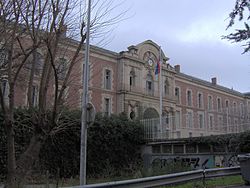Joseph Joffre - Picture
More about World War 1
|
|
|
Joseph Joffre
Nickname: Papa Joffre
Place of birth: Rivesaltes, France
Place of death: Paris, France
Allegiance: France
Service/branch: French Army
Years of service: 1871-1919
Rank: Général de division
Battles/wars: Franco-Prussian War
*Siege of Paris
Sino-French War
World War I
*First Battle of the Marne
Awards: Marshal of France
Grand cross of the Légion d'honneur
Médaille militaire
Croix de guerre 1914-1918
Distinguished Service Medal (US)
Knight Grand Cross of the Bath (UK)
Order of Merit (UK)
Marshal of France
Grand cross of the Légion d'honneur
Médaille militaire
Croix de guerre 1914-1918
Distinguished Service Medal (US)
Knight Grand Cross of the Bath (UK)
Joseph Jacques Césaire Joffre ( 12 January 1852 - 3 January 1931) was a French Catalan general during the First World War. He is most known for regrouping the retreating allied armies to defeat the Germans at the strategically decisive First Battle of the Marne in 1914. His popularity led to his nickname Papa Joffre.
Biography
Joffre was born in Rivesaltes, Roussillon, the son of a Catalan family of vineyard owners. He entered the x‰cole Polytechnique in 1870 and became a career officer. He first saw active service during the Siege of Paris in the Franco-Prussian War, but spent much of his career in the colonies as a military engineer, serving with distinction in the Keelung Campaign during the Sino-French War (August 1884-April 1885). He returned to France and was made commander-in-chief of the French Army (1911), after Joseph Gallieni declined the post. With the revival of the army and a purge of "defensive-minded" officers he adopted the strategy devised by Ferdinand Foch, the offensive known as Plan XVII. Joffre was selected to command despite never having commanded an Army, even on paper, and "having no knowledge whatever of General Staff work."
Picture - The statue in Place Joffre, Paris, before the x‰cole Militaire
At the outbreak of war, the French plan clashed with the German Schlieffen Plan, much to the detriment of the French. Joffre helped to retrieve the situation through retreat and counterattack at the First Battle of the Marne. He combined the French 9th and 10th armies into the French 6th army in under two weeks before turning it over to Joseph Gallieni in the First Battle of the Marne. His major positive contributions that won the Battle of the Marne were 1) his sustained calm under pressure and the calculated reasoning of an alumnus from Ecole Polytechnique 2) his ruthless dismissal of incompetent generals during the summer of 1914 and 3) his outstanding logistical handling of French infantry divisional movements and artillery ammunition supplies during and after the French retreat of July 1914. Following the enormous losses at Verdun and particularly at the Anglo-French offensive at the Somme which he had championned he was replaced by General Robert Nivelle on 13 December 1916.
Still popular, Joffre was made Marshal of France, the first man to receive that rank under the Third Republic, but his role was little more than ceremonial. Following the catastrophic defeats of France's ally Romania at the hands of Central Powers in late 1916, that forced the capital Bucharest to be evacuated, Joffre was appointed as head of the French Military Mission aimed at reforming the Romanian army. He spent the first part of 1917 there. In June 1917, he was appointed head of the French military mission to the USA, then leader of the Supreme War Council in 1918. In 1918, Mount Joffre in Western Canada was named after him. He retired in 1919 and was made a member of the Académie franx§aise.
In 1920 Joffre presided over the Jocs Florals in Barcelona, a Catalan literary certamen. He died on 3 January 1931 in Paris and was buried on his estate in Louveciennes. His memoirs, in two volumes, were published posthumously in 1932.
Honors

Picture - The Lycée Joffre, a high school and former military barracks in Montpellier, bears Joffre's name
The Joffre class of steam locomotives was a French Decauville design built by Kerr Stuart under contract during 1915 and 1916.
A French aircraft carrier bearing Joffre's name was under construction at the start of World War II but was never completed due to France's rapid fall in 1940.
The Joffre cake is named after him.
The following landmarks were named in Joffre's honor:
Place Joffre, Avenue de la Motte-Piquet, Paris, with bronze statue of mounted subject.
Rue du Maréchal Joffre located in Nice, France
Mount Joffre, a mountain located on the Continental Divide, in British Columbia
Rue Joffre (Joffre Street), located in Shawinigan, Quebec, Canada.
Joffre Avenue, located in Milltown, New Jersey, USA.
Avenue Joffre, located in Shanghai, China (since renamed Huaihai Road).
Joffre Street, located in Pascoe Vale, Victoria, Australia.
Joffre, Pennsylvania, zip code 15053 (Latitude 40.4 degrees north; Longitude 80.4 degrees west).
Avenue du Maréchal Joffre located in Verdun, France
Fuller, J.F.C., Military History of the Western World
More aircraft.
Source: WikiPedia